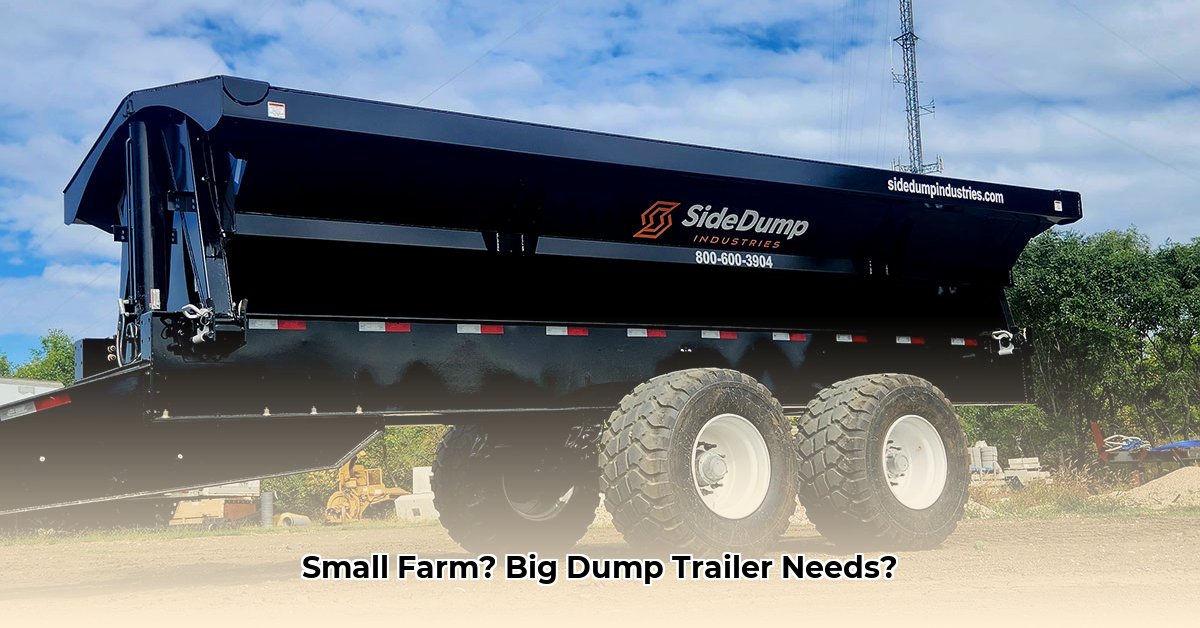
Finding the Right Dump Trailer for Your Small Farm
Running a small farm demands versatile, durable equipment. A dump trailer significantly boosts efficiency, handling everything from gravel and mulch to harvested crops. This guide helps you choose the ideal trailer for your needs, covering factors like size, materials, and cost. We'll also provide practical maintenance tips to extend the life of your investment. For more options, check out this helpful resource on dump trailer options.
Key Considerations for Choosing a Dump Trailer
Selecting the perfect dump trailer involves several crucial factors. These factors directly impact both your farm's productivity and your overall budget.
Size and Capacity: Matching Your Needs
Trailer size is crucial for maneuverability, especially on smaller farms with limited space. Consider the typical size and weight of your loads. A smaller, 1.5-ton capacity trailer might suffice for many operations, but larger loads require a higher capacity. Always check your tractor's towing capacity to avoid dangerous overloads. What's the typical weight of your heaviest load? This question will guide the right capacity selection for your farm.
Materials and Durability: Steel, Aluminum, and Beyond
Most dump trailers use steel, renowned for strength and longevity. However, aluminum offers lighter weight, reducing strain on your tractor, though potentially at the cost of durability. Steel trailers generally have higher upfront costs but may last longer, potentially offsetting expenses over time. Are longevity and strength your top priorities, or is lightweight maneuverability more important? The answer dictates your material choice.
Hitch Types: Ensuring Compatibility
Before model selection, verify your tractor's hitch type. Ball hitches are common, also compatible with ATVs and UTVs. Some trailers offer drawbar hitches, enhancing stability, especially with tractors. Checking your tractor's hitch is crucial to prevent an incompatibility issue.
Dumping Mechanisms: Manual vs. Hydraulic
Manual dumping requires physical effort, being less expensive but more physically demanding, especially with heavier loads. Hydraulic systems offer convenience, but at a higher upfront cost. Frequent heavy hauling justifies the investment in a hydraulic system.
Maintenance and Lifecycle Costs: Long-Term Value
While the initial price matters, consider long-term costs, including maintenance, repairs, and fuel consumption, especially when considering the differences between steel and aluminum. Even consider alternative methods, such as using wheelbarrows. We'll create a cost comparison framework shortly. How do you plan on incorporating trailer maintenance into your farming budget? A proactive maintenance plan dramatically extends your trailer’s lifespan.
Safety Features and Regulations: Prioritizing Safety
Always prioritize safety. Obey speed limits when towing; never exceed your tractor's or trailer's rated capacity. Regularly inspect the trailer to ensure everything is in good working order. Familiarize yourself with all applicable state and local safety regulations concerning farm equipment.
Comparison of Models and Brands
Researching different models from various brands is crucial to ensure you find the best fit. Below is a sample comparison table (note that prices will vary depending on retailer and location):
| Manufacturer | Model | Capacity | Material | Hitch Type(s) | Price (approx.) |
|---|---|---|---|---|---|
| RK Kutter | [Specific Model] | 1.5 Ton | Steel | Ball, Drawbar | $2,500 - $3,500 |
| [Another Brand] | [Specific Model] | 2 Ton | Aluminum | Ball | $2,000 - $3,000 |
| [Another Brand] | [Specific Model] | 1 Ton | Steel | Drawbar | $1,800 - $2,800 |
(Note: Prices are estimates and vary by retailer and location. Obtain current quotes from local dealers.)
Buying Guide and Tips for Small Farm Dump Trailers
Purchasing a dump trailer requires careful planning. Here's a step-by-step guide:
- Assess Your Needs: What will you haul, and how frequently? Determine the minimum capacity and features required.
- Explore Financing Options: Many farm equipment dealers offer financing plans; explore your options.
- Check Availability and Lead Times: Some models might require special ordering, resulting in longer lead times. Contact suppliers for realistic delivery expectations.
- Negotiate Price: Don't be afraid to negotiate, especially with larger purchases. Compare quotes from multiple suppliers.
Maintenance and Troubleshooting Your Dump Trailer
Regular maintenance is crucial for extending your trailer's lifespan. These steps are key:
- Lubrication: Regular lubrication of moving parts minimizes wear and tear.
- Inspections: Regular and thorough inspections can prevent major problems.
- Prompt Repairs: Address any problems immediately to prevent minor issues from escalating.
- Cleaning: Keep your trailer clean to prevent rust and corrosion.
Conclusion: Investing in Your Farm's Future
Selecting the appropriate dump trailer significantly impacts efficiency and productivity on your small farm. This guide provides the framework you need to make an informed decision. Remember, the ideal trailer balances your hauling needs, budget, and operational requirements. With careful planning and regular maintenance, your investment will pay dividends for years to come.